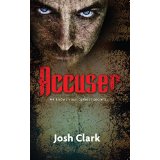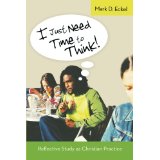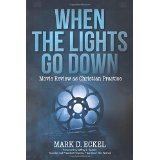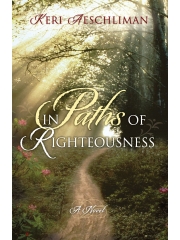
Interview with Author, Mark Eckel
I have the privilege of calling Mark Eckel my friend. I have learned so much from this man, in casual conversation and through his writing. If you are not familiar with Mark and his work, I highly suggest you get your hands on one (or both) of these books! You won’t regret it!
A little about your writing:
You have a new book out within a year of your last book. How could you write another book so quickly?
My first book I Just Need Time To Think: Reflective Study as Christian Practice was based on a series of 52 essays I wrote in 2009-10. I organized the essays into a book. At that time I already had in mind what the next book would be. For over 30 years I have been watching, discussing, and interpreting movies with my students. The book is full of stories from these encounters: When the Lights Go Down: Movie Review as Christian Practice. From January through June of this year I wrote one 1000 word essay toward the book each week based on those stories.
The answer to your question is I have a large backlog of writing which needs the organization a book can provide. If one has a large amount of written material, writing a book becomes much easier. And I have already started on the next book!
Well, you’ve peaked my interest! What is the next book about?
The title of the book will be Education IS Ownership: Teaching-Learning as Christian Practice. Again, I have a huge amount of material on the subject which I have been writing about for years. I will organize the book in a similar way to the others: short essays which can be quickly read. I will use stories and writings from my website: warpandwoof.org
What does “warp and woof” mean and how did you come up with that title?!
“Warp and woof” are the vertical and horizontal threads that make up any piece of fabric. In the Christian tradition “warp and woof” means coherence: by Christ are all things held together (Colossians 1.17). As an Old Testament teacher I am a Hebraic thinker. Hebrews taught that life is whole, everything is sacred, God created all things, and by Him are all things sustained.
The name for the website came from the person who most influenced my life even though we never met. His name is Francis Schaeffer. He taught, like the Hebrews, that there was no split between “secular” and sacred. Indeed, “secular” did not exist. He used “warp and woof” to describe the wholeness of God’s world. The website is named in his honor.
Let’s talk about your books. What message do you hope the reader will take away from I Just Need Time to Think and When the Lights Go Down?
The subtitles to my books are important. Reflective Study as Christian Practice is key to the first. I believe life should be taken slowly, not rushed. There is a need for time to rest, ponder, consider, reflect. The second subtitle, Movie Review as Christian Practice, is meant to spur believers to think about what they watch.
What did you learn while writing the books?
I learned what I already knew: writing is very, very hard. Discipline and perseverance in creative writing is more difficult than anything else I do. I bear responsibility that the writing is correct (content) and that it is received (communication). Thinking of what needs to be said along with who will read what is said is a complicated tension to maintain.
Now that the projects are complete, are there any last minute thoughts you wish you had added?
Oh my! There is always something I think should have been written here or there! That is the problem with writers: we just won’t shut up! J
A little about you:
Do you have any strange writing habits, like wearing a special hat or taking breaks to stand on your head?
My real problem is that the refrigerator is too close! I am easily distracted by food! J I would say that I write all the time. That might seem weird (“How can anyone write all the time?!”) but I have notes all over the place: I even write on my hand so as not to forget an idea!
What writers inspire you and why?
I am inspired by storytellers. I find stories everywhere by lots of different people. For instance, Reader’s Digest is a great place to find real stories about real people in real life. National Public Radio often makes me search out the narrative of a person I’ve just heard about on one of their shows. One of our best living storytellers is Stephen Mansfield. He wrote a book about how businesses should treat their employees entitled The Search for God and Guinness. I finished reading just the introduction and wept. I thought if the Guinness family could model a Christian approach to wealth while caring deeply for their own workers, why couldn’t everyone do that?
What are you currently reading?
I am normally reading about 17 books at the same time. That’s no lie. As a professor I am constantly reading. At the moment I am about to begin Unbroken which is the story about Louis Zamperini, a World War II hero. Next in the queue is Horse Soldiers. One of my students this year was one of the first warriors that went in to Afghanistan in 2001 on horseback: a horse soldier. I wanted to know more about what he did.
When you enter a book store, which section do you head to first?
I am what you would call an interdisciplinarian, which basically means I am interested in everything! So if I go to a book store, you would see no rhyme no reason to where I go in the book stacks! Being someone whose discipline (mine is “theology”) intersects with everyone else’s goes back to what I said before about “warp and woof.” Everything is God’s, therefore everything is sacred, so I bear responsibility to learn about the whole of God’s world to be able to teach others theologically.
If you could choose an author to mentor you, who would it be? Why?
This one might surprise you: Stephen King. Stephen King is one of those folks who is constantly pointing at truth. Mr. King does not subscribe to a Christian view of life as I do but his writing style is so riveting, he has dozens of books to his credit, millions of readers, and millions more who have seen movies based on his writing. People might be surprised to know that the most popular movie of all time—The Shawshank Redemption—is based on a Stephen King novella. Mr. King writes horror stories which means that I agree with him about two essential beliefs: (1) there is a supernatural world and (2) evil exists and must be defeated. He wrote On Writing: A Memoir of the Craft where he said one of the most profound, simplest, and difficult processes for a writer to do—“kill your darlings.” I am constantly cutting some of what I think are the best sentences out of essays because they just do not fit.
What do you like to do when you aren’t writing?
Read. I like to be with my family, have conversations, watch movies, and teach. Did I mention eating?!
Do you like to travel? If so, what is your favorite travel destination?
Most of my travel time is taken up going to the places where I will teach. If I could choose, my destinations would be north and west. I love mountains, snow, and cold.
Tell us a little about your family.
My wife Robin is a second grade teacher. She loves her students and the families love her. My son Tyler is one of the last people I know who sends real letters in the mail, in his own hand writing; he is a home caregiver. My daughter Chelsea is a poet, mother of Marilyn, full-time homemaker, and lover of people. My son (-in-law) Sam is a pastor-teacher who builds a sermon every week just like he could build you a cabinet, just out of different materials. My little sister Jan and her family live and work in Littleton, Colorado. My mom lives about 3 miles from Jan and still works (at 80!) as a wellness nurse.
In I Just Need Time to Think, you talk a lot about the importance of taking a Sabbath. Tell us how you spend your day of rest.
That depends. If it’s football season, Sunday afternoon is spent following one of my favorite sports. Whatever else I do, I try to stay away from writing, thinking, and researching!
Is there a question about you or your books that you wish someone would ask, but no one has?
Question: “Why do you write so much?”
Answer: “I’m compelled to create, recreate, explain, tell, or interpret what I see around me for other people. At my core, I am a bridge-builder. I see something on another shoreline and want the people on my side of the water to see what I see. So I build a bridge, usually in the form of a short essay, to create ‘Ah ha!’ moments for people. One of the most gratifying statements I ever hear from someone who reads my writing is, ‘I’ve never thought about that before!’ I am a bridge-builder, bridging people to ideas. As a writer, as a teacher, I want to show people a land that they may have never seen before.”
Thanks, Mark!






